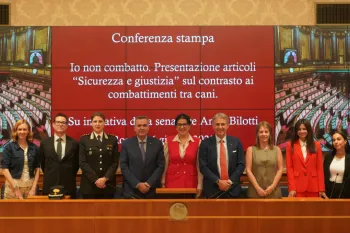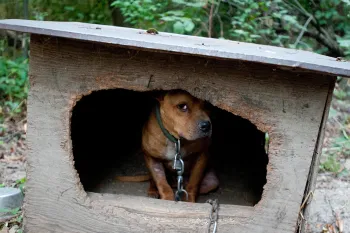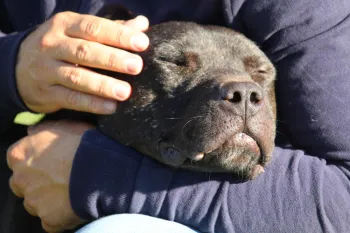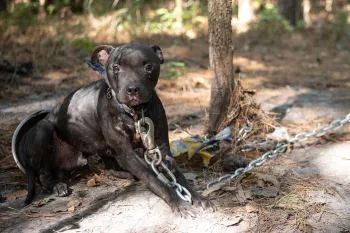ROME, Italy—Dogfighting remains widespread across Italy—not only in the South—in part due to fake “rescues,” which criminals exploit as a means to transport fighting dogs from one region to another. These “rescues” mimic the legitimate transfer of stray animals to facilitate adoption. To effectively combat these practices, a multi-level strategy is needed: training law enforcement officers, raising public awareness, rehabilitating the dogs involved, and reforming and re-educating the perpetrators.
This was the central message of the press conference organized by Humane World for Animals Italy (formerly called Humane Society International/Europe) and Fondazione Cave Canem, held at the Italian Senate on June 26 at the initiative of Senator Anna Bilotti. The event brought together experts, legal scholars, institutional representatives, and law enforcement officials.
Senator Anna Bilotti (Five Star Movement) stated: “Dogfighting is not a marginal deviance. It is a dark, despicable part of the broader mosaic of organized crime. It is a scourge that tears at the fabric of our society and exposes the depth of its indifference. Yet in Italy, we still lack a systemic mechanism for prevention and enforcement. Thanks to the ‘Io non combatto’ project, Humane World for Animals and Fondazione Cave Canem are working—patiently and with determination—to build a cultural, educational, legal and ethical barrier against this barbarity.”
Hon. Sergio Costa, vice president of the Chamber of Deputies, added: “Dogfighting is not only a barbaric act of cruelty against animals—it is a criminal activity that involves mafia organizations and the corruption of minors. The partnership between Humane World for Animals, Fondazione Cave Canem and our institutions through the ‘Io non combatto’ project shows that only an integrated approach—training law enforcement, raising public awareness, and rehabilitating rescued animals—can truly eradicate this scourge. The recent reform of the Penal Code, which now recognizes ‘crimes against animals’ rather than merely offenses against human sentiment, provides more effective legal tools to prosecute all accomplices, including spectators. This is a battle for civility that we can no longer postpone.”
During the press conference, the findings of a study on dogfighting conducted by Carolina Salomoni and Angela Maria Panzini—recipients of a research grant awarded through the “Io non combatto” project—were presented. The research, coordinated by Martina Pluda and Alessandro Fazzi, respectively director and consultant for Humane World for Animals Italy, and by Federica Faiella, president of Fondazione Cave Canem, was recently published in two issues of the journal “Sicurezza e Giustizia”.
Carabinieri General Michele Lippiello, editorial director of “Sicurezza e Giustizia”, stated: “Our journal is aimed at law enforcement, the armed forces, the judiciary, and the academic world. Over my decades of experience, I’ve come to realize that communication—especially for younger generations—must be immediate. We are committed to promoting the One Health principle, which recognizes the interconnection between environmental, human, and animal health, through both legal and practical approaches, with a strong focus on prevention. Only by understanding an illegal practice in all its complexity can we effectively intervene to stop it.”
While the role of the media is crucial in educating the public and increasing awareness among institutions and law enforcement, the contribution of animal protection organizations is equally important. That’s why representatives of Humane World for Animals and Fondazione Cave Canem—who have been running the “Io non combatto” project for four years—regularly participate as trainers in national police education programs. They also frequently organize in-person and online events for schools and the wider public, including a series of webinars focused on the rehabilitation of dogs rescued from illegal fighting rings. Moreover, they are firmly committed to promoting research initiatives that help deepen understanding of the strategies and tools needed to combat animal-related crimes.
Martina Pluda, director of Humane World for Animals Italy, commented: “Since its inception, the ‘Io non combatto’ project has included training, educational and outreach activities, as well as direct intervention to support the dogs involved. All of this has taken place within a network we have built over the years—composed of law enforcement officials, veterinarians, legal experts, institutions, and shelter staff. The commitment of Senator Bilotti and Vice President Costa to issues such as animal welfare and the rule of law gives us hope for the future of our project and for the practical application of the findings from the research we carried out alongside Salomoni and Panzini. This study was designed to provide a useful tool for all professionals working to suppress this criminal practice.”
Lieutenant Colonel Irene Davì, commander of the operational unit of the CITES division of the Carabinieri (one of Italy’s main law enforcement agencies), stated: “Dogfighting generates significant profits for criminal groups and represents one of the most brutal forms of animal abuse. Dogs are selected based on their physical traits and behavioral tendencies and trained through violent and cruel methods. Training is often entrusted to individuals based in Italy—especially in Emilia-Romagna, Lazio, Abruzzo, Campania and Sicily—or in foreign countries such as Serbia. Those involved frequently have criminal records related to violence, drug trafficking, or illegal possession of firearms. Meanwhile, minors who witness these fights are conditioned to see violence as something normal.”
Federica Faiella, president of Fondazione Cave Canem, emphasized how deeply rooted and insidious the practice of animal fighting is, both nationally and internationally: “The ‘Io non combatto’ project was born out of this awareness: the need to implement a cross-cutting, integrated approach. Presenting scientific research on this issue in the Senate is a powerful statement—and even more so because the research was authored by two young women. The fight against dogfighting by the ‘Io non combatto’ team also includes an operational front: from technical and legal collaboration with law enforcement and the judiciary, to obtaining judicial custody of the seized animals, to managing their behavioral rehabilitation, with the goal—where possible—of reintegrating them into a family setting. This is made possible thanks to a team of professionals specialized in rehabilitating dogs with severe behavioral issues, coordinated by Mirko Zuccari.”
As highlighted by Angela Maria Panzini, co-author of the research published in Sicurezza e Giustizia, “The phenomenon of dogfighting can no longer be confined to one specific area of Italy, as was the case in the past. Its spread has been facilitated by the widespread presence of mafia activity across various regions. These organizations are constantly forced to change the location of the fights to avoid detection and move dogs across the country using fake ‘rescues’—trips that are typically organized to bring shelter dogs and cats to their adoptive families.”
Alessandro Fazzi, a consultant for Humane World for Animals Italy with expertise in animal law, stated: “From now on, thanks to the recent reforms of the Penal Code and the Code of Criminal Procedure introduced by Law No. 85 of 2025, anyone participating in dogfighting in any capacity can be prosecuted: spectators are no longer seen as mere onlookers, but as accomplices. In addition, the introduction of aggravating factors—such as the presence of minors—will allow us to address this crime in all its forms. And the possibility of permanently entrusting seized or confiscated animals to authorized organizations, with the payment of a financial guarantee, will give these dogs immediate access to psychological and physical rehabilitation and, where possible, integration into a family environment.”
At the same time, it is essential to analyze both the background and the psychological profile of offenders before involving them in specific rehabilitation programs. Carolina Salomoni, co-author of the study published in Sicurezza e Giustizia, concluded: “A purely punitive approach, while necessary, is not enough to protect society in the long term. In a controlled setting—such as the prison system—it is possible to design re-education programs focused on developing empathy, involving not only the dogfighter but also a non-human animal. The first phase could include mediated interaction through photos and videos; the second phase could involve real interactions with animals from shelters. These are difficult projects to implement, so cooperation among all those involved is essential.”
#



